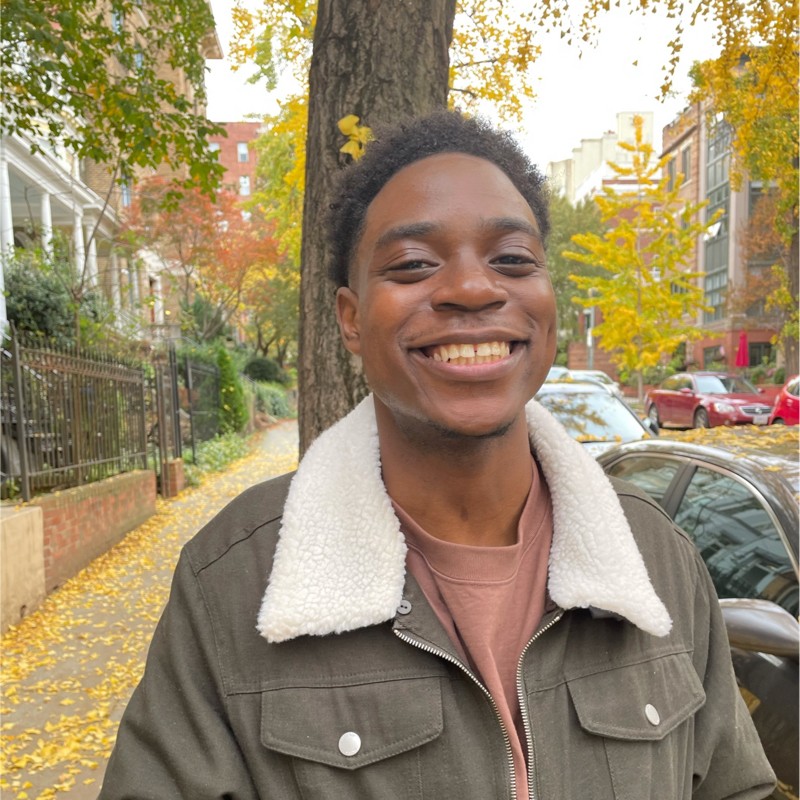
Adewale A. Maye ‘18
Title: Policy and Research Analyst, Program on Race, Ethnicity, and the Economy
Employer: Economic Policy Institute
Major: Economics
What do you enjoy the most about your position?
What I enjoy most about my job is the opportunity to research and advocate for policies that empower marginalized communities and dismantle barriers to prosperity and mobility within the United States. Knowing the work that I do is meaningful constantly keeps me motivated and inspired to do more. The Economic Policy Institute share these values in our shared mission to inform and empower individuals to seek solutions that ensure broadly shared prosperity and opportunity as well as protect and improve the economic conditions of low- and middle-income workers.
What is a typical day like in your position?
Typically, I divide my days in two – reflecting the research and policy responsibilities that I'd need to undertake within a given day. The first half of my day, I'll have many of my coalition and team calls. These meetings keep me abreast of current policy developments on the Hill as well as coalition needs and requests. During this time, I'll also reach out to state and national partners to advance economic policy priorities and gather policy updates they have on new bills or legislation that center racial equity and economic justice.
During the second half of my day, I schedule time to do a lot of my writing and research. This entails gathering information on recent bills and guidances, analyzing data sets, or even doing some coding to clean data sets. I'm typically working on a number of projects at once, but I often have the opportunity to collaborate with many of the brilliant analysts and economists that I work with. Throughout the month, I publish blogs, reports, and data snapshots that reflect our policy priorities or analyze recent data releases. From time to time, I also attend webinars and conferences with the intention of learning about new research and data and connecting with partners and allies.
Which undergraduate experiences did you find most helpful in preparing you for your current position?
Internships played a pivotal role in preparing me for my current position and my career in economic policy more broadly. Shortly after I had graduated, I interned with the Center for Economic and Policy Research where I gained skills in interpreting data sets and writing blogs and reports on various labor policy subjects including poverty and inequality, workplace benefits, wages, and the gig economy. This opportunity granted me the necessary foundation to apply economic data trends and results to support inclusive policy solutions. Furthermore, my experience enabled me to build upon my quantitative research and analytical skills and become a much stronger writer. These skills are integral to all the work that I currently do as a Research and Policy Analyst and are very important to develop if you're interested in starting a career in this space.
How has your coursework helped you in your current position (i.e. quantitative skills, research techniques, communication skills)?
One of the most valuable classes I took as at the University was my Econometrics class. This class provided the tools to enhance my skills in data analysis and statistical programming both of which I've needed to utilize at my job. For policy, other classes such as "Current Issues in American Economic Policy" and "Economic Development of Selected Areas: Latin America" were also helpful in using economics as a lens to solve social policy issues. Additionally, I found taking electives within the School of Public Policy and the African American Studies Department as a great way to take a more interdisciplinary and intersectional approach to my studies and better inform the social history of the political economy within the U.S.
What advice do you have for students trying to find jobs or internships in your field?
Economic policy is a wide-ranging field of opportunity that encompasses and intersects with many other fields of study. My advice would be to leverage this flexibility to explore what you're passionate within economic policy. Issue areas like health, education, environment and labor are all great foundations to start from and build your research around. Next, research organizations that are doing that work. In D.C., there are countless policy organizations and think tanks to choose from as well as various ways to get involved.
Once you've found those organizations, stay updated on recent research, papers, and reports that they've published in the field you're interested in. This provides a preview of the work you may be doing in the future and is a great way to stay informed and build expertise. Lastly, don't dismiss your lived experience! Economic policy shapes all of our lives, some more than others. Feel free to use your life, your family, and your community as a lens for the work you want to do and the communities you seek to help. Lived experience can be a crucial tool in advocacy work and is often valuable in engaging with groups who would greatly benefit from the policies you're advocating for.
Any other advice?
If you can, I would definitely recommend learning a coding language! Stata, R, SAS, and Python are all useful programming packages to learn not only in this space, but in others as well. Gaining experience with these technical skills will definitely set you apart as a job applicant and equip you with the tools to better handle data.
As a last piece of advice, don't be discouraged! Finding an internship isn't always an easy task and finding a job or career can be difficult as well. However, the University has so many resources to help you along your academic and professional journey. Don't be afraid to utilize them! You're going to do amazing things and if you ever need help, your professors, advisors, and fellow alumni will be happy to lend a helping hand.

